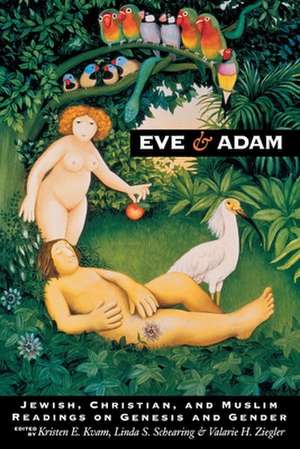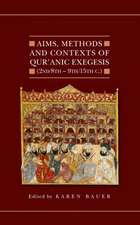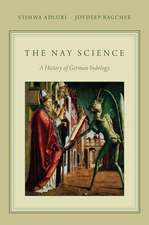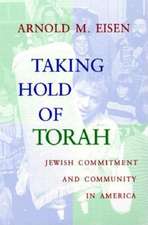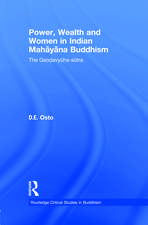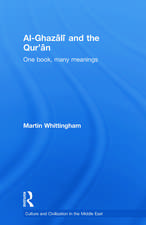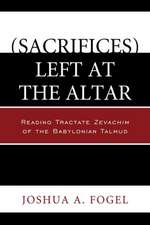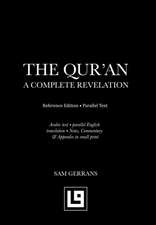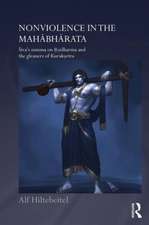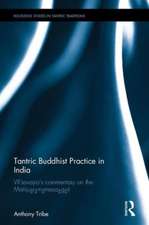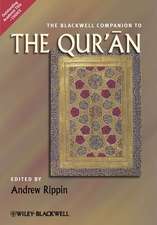Eve and Adam – Jewish, Christian, and Muslim Readings on Genesis and Gender
Autor Kristen E. Kvam, Linda S. Schearing, Valarie H. Ziegleren Limba Engleză Paperback – 14 mai 1999
Preț: 253.10 lei
Nou
Puncte Express: 380
Preț estimativ în valută:
48.43€ • 50.69$ • 40.31£
48.43€ • 50.69$ • 40.31£
Carte tipărită la comandă
Livrare economică 31 martie-14 aprilie
Preluare comenzi: 021 569.72.76
Specificații
ISBN-13: 9780253212719
ISBN-10: 0253212715
Pagini: 536
Dimensiuni: 157 x 233 x 32 mm
Greutate: 0.75 kg
Ediția:0007
Editura: MH – Indiana University Press
ISBN-10: 0253212715
Pagini: 536
Dimensiuni: 157 x 233 x 32 mm
Greutate: 0.75 kg
Ediția:0007
Editura: MH – Indiana University Press
Cuprins
Acknowledgments
General Introduction
1. Hebrew Bible Accounts
Introduction
Selections and Commentary
Genesis 1:1-2:4a
Genesis 2:4b-3:24
Genesis 4:1-4:2
Genesis 5:1-5:5
2. Jewish Postbiblical Interpretations (200s BCE-200 CE)
Introduction
Apocrypha (Deuterocanon) and Pseudepigrapha
1 Enoch (c. 200s BCE)
Sirach (c. 180 BCE)
Jubilees (c. mid-100s BCE)
Wisdom of Solomon (c. 30s BCE-100 CE)
2 Esdras (c. 100 CE)
2 Baruch (c. early 100s CE)
Life of Adam and Eve (c. late 100s-400 CE)
Jewish Philosophers and Historians
Philo, Questions and Answers on Genesis (c. 20s-40s CE)
Josephus, Jewish Antiquities (c. 90s CE)
3. Rabbinic Interpretations (200-600s CE)
Introduction
Midrash Rabbah and Babylonian Talmud
Themes on HumankindÕs Creation
Themes on the Disobedience
Themes on Adam and Eve after Eden
Themes on Humankind in the Post-Edenic World
Targums
Targum Onqelos to Genesis (c. 100s)
Targum Pseudo-Jonathan: Genesis (pre 600)
4. Early Christian Interpretations (50-450 CE)
Introduction
New Testament (c. 50-150 CE)
ÒEgalitarianÓ Texts
1 Corinthians 15:21-22
Galatians 3:27-28
Ephesians 4:22-24
Colossians 3:9-11
ÒHierarchicalÓ Texts
1 Corinthians 11:3-12
2 Corinthians 11:2-6
Ephesians 5:21-6:9
1 Timothy 2:8-15
Extracanonical Sources
The Gospel According to Thomas (c. 50-150)
The Gospel According to Philip (pre 350)
The Acts of Paul and Thecla (c. 100s)
Church Fathers
Theophilus, ÒApology to AutolycusÓ (late 100s)
Anastasius Sinaita, Anagogicarum Contemplationum (c. 150-250)
Tertullian, ÒOn the Apparel of WomenÓ (c. 202)
Origen, ÒHomilies on Genesis: 1 and 6Ó (c. 240)
Ambrose, ÒParadiseÓ (c. 375)
John Chrysostom, Homilies on Genesis (c. 386)
Augustine, The Literal Meaning of Genesis (begun c. 401)
5. Medieval Readings: Muslim, Jewish, and Christian (600-1500 CE)
Introduction
Islam
The QurÕan (c. 610-632)
Surah 2, The Cow: 2:29-38, 222-223, 228
Surah 4, Women: 4:1, 3, 34-36, 116-120, 128-130
Surah 7, The Heights: 7:19-27, 189-190
Surah 15, Al-Hijr: 15:26-45
Surah 20, T H: 20:115-123
Surah 23, The Believers: 23:12-14
Surah 24, Light: 24:30-33
Surah 30, The Romans: 30:20-22
Surah 49, The Private Apartments: 49:13
Muslim Interpretations
Al-Tabari, Commentary on the QurÕan
(c. late 800s)
Al-Kisa I, The Tales of the Prophets of al-KisaI (collected c. 1200)
Ibn AlÕ Arabi, The Bezels of Wisdom (c. 1200s)
Judaism
Midrashic Themes:
The Fathers According to Rabbi Nathan (c. 600-700s)
Pirke de Rabbi Eliezer (c. 700-800s)
Alphabet of Ben Sira (c. 700-900s)
The Chronicle of Jerahmeel (c. 1300s)
Rashi, Commentary on the Pentateuch (c. late 100s)
Nahmanides, Commentary on the Torah (c. 1200s)
Maimonides, Guide for the Perplexed (c. late 1100s)
Isaac Kohen, Treatise on the Left Emanation (c. 1100s)
The Zohar, Bereshit (c. late 1200s)
Christianity
Thomas Aquinas, Summa Theologiae (begun c. 1260)
Christine de Pizan, Letter of the God of Love (1399)
Heinrich Kramer and James Sprenger, Malleus Maleficarum (1496)
6. Interpretations from the Protestant Reformation (1517-1700 CE)
Introduction
Balthasar Hubmaier, Freedom of the Will (1527)
Martin Luther, Lectures on Genesis (begun 1535)
John Calvin, Commentaries on the First Book of Moses Called Genesis (c. 1555)
Margaret Fell, WOMENS SPEAKING Justified, Proved and Allowed by the Scriptures (1666)
John Milton, Paradise Lost (1667)
7. Societal Applications in the United States (1800s CE)
Introduction
Antebellum Debates on Household Hierarchies
Proslavery and Antislavery Views
Fred A. Ross, Slavery Ordained of God (1857)
Samuel B. Howe, Slaveholding Not Sinful (1856)
Josiah Priest, Bible Defence of Slavery (1851)
Rev. Charles Elliott, Sinfulness of American Slavery (1851)
Women Make the Case for Equality
Sarah Grimk, Letters on the Equality of the Sexes and the Condition of Woman (1838)
Elizabeth Cady Stanton, ed. The WomanÕs Bible (1895, 1898)
New Religious Movements on Gender Relations
Shakers
Frederick Evans, Autobiography of a Shaker (1888) and Compendium (1867)
Paulina Bates, The Divine Book of Holy and Eternal Wisdom (1849)
Oneida Community
John Humphrey Noyes, History of American Socialism (1870)
Christian Science
Mary Baker Eddy, Science and Health with Key to the Scriptures (c. 1875)
8. Twentieth Century Readings: The Debates Continue
Introduction
Hierarchical Interpretations
Council on Biblical Manhood and Womanhood, ÒThe Danvers StatementÓ (1987)
Susan T. Foh, ÒThe Head of the Woman Is the ManÓ (1989)
Joseph H. Hertz (ed.), The Authorized Daily Prayer Book (1945)
Samuel H. Dresner, ÒHomosexuality and the Order of CreationÓ (1991)
Sayyid Abu al-AÕla Mawdudi, Towards Understanding the QurÕan (1942-1972)
Egalitarian Interpretations
Sun Ai Lee Park, untitled poem
Judith Plaskow, ÒThe Coming of Lilith: Toward a Feminist TheologyÓ (1979) and ÒLilith RevisitedÓ (1995)
Phyllis Trible, ÒEve and Adam: Genesis 2-3 RereadÓ (1973) and ÒNot a Jot, Not a Tittle: Genesis 3-3 after Twenty YearsÓ (1995)
Jouette Bassler, ÒDeception in the Garden: 1 Timothy 2:11-15Ó (1994)
Ann Holmes Redding, ÒNot Again: Another Look at the Household CodesÓ (1995)
Riffat Hassan, ÒThe Issue of Woman-Man Equality in the Islamic TraditionÓ (1993)
Nancy Datan, ÒForbidden Fruits and SorrowÓ (1986)
Appendix: The Preadamite Theory and the Christian Identity Movement: Race and Genesis 1-3 at the Turn of the Millennium
Introduction
Nineteenth Century Preadamite Approaches
A Minister [D. G. Phillips], ÒNachash: What Is It? or An Answer to the Question, ÔWho and What Is the Negro?Õ Drawn from RevelationÓ (1868)
Prospero, ÒCaliban: A Sequel to ÔArielÕÓ (1868)
Genesis and White Supremacy in the Twentieth Century
Wesley A. Swift, ÒGod, Man, Nations &the RacesÓ (no date)
Richard G. Butler, ÒWho, What, Why, When and Where: The Aryan NationsÓ (no date) and ÒThe Aryan WarriorÓ(no date)
Index
General Introduction
1. Hebrew Bible Accounts
Introduction
Selections and Commentary
Genesis 1:1-2:4a
Genesis 2:4b-3:24
Genesis 4:1-4:2
Genesis 5:1-5:5
2. Jewish Postbiblical Interpretations (200s BCE-200 CE)
Introduction
Apocrypha (Deuterocanon) and Pseudepigrapha
1 Enoch (c. 200s BCE)
Sirach (c. 180 BCE)
Jubilees (c. mid-100s BCE)
Wisdom of Solomon (c. 30s BCE-100 CE)
2 Esdras (c. 100 CE)
2 Baruch (c. early 100s CE)
Life of Adam and Eve (c. late 100s-400 CE)
Jewish Philosophers and Historians
Philo, Questions and Answers on Genesis (c. 20s-40s CE)
Josephus, Jewish Antiquities (c. 90s CE)
3. Rabbinic Interpretations (200-600s CE)
Introduction
Midrash Rabbah and Babylonian Talmud
Themes on HumankindÕs Creation
Themes on the Disobedience
Themes on Adam and Eve after Eden
Themes on Humankind in the Post-Edenic World
Targums
Targum Onqelos to Genesis (c. 100s)
Targum Pseudo-Jonathan: Genesis (pre 600)
4. Early Christian Interpretations (50-450 CE)
Introduction
New Testament (c. 50-150 CE)
ÒEgalitarianÓ Texts
1 Corinthians 15:21-22
Galatians 3:27-28
Ephesians 4:22-24
Colossians 3:9-11
ÒHierarchicalÓ Texts
1 Corinthians 11:3-12
2 Corinthians 11:2-6
Ephesians 5:21-6:9
1 Timothy 2:8-15
Extracanonical Sources
The Gospel According to Thomas (c. 50-150)
The Gospel According to Philip (pre 350)
The Acts of Paul and Thecla (c. 100s)
Church Fathers
Theophilus, ÒApology to AutolycusÓ (late 100s)
Anastasius Sinaita, Anagogicarum Contemplationum (c. 150-250)
Tertullian, ÒOn the Apparel of WomenÓ (c. 202)
Origen, ÒHomilies on Genesis: 1 and 6Ó (c. 240)
Ambrose, ÒParadiseÓ (c. 375)
John Chrysostom, Homilies on Genesis (c. 386)
Augustine, The Literal Meaning of Genesis (begun c. 401)
5. Medieval Readings: Muslim, Jewish, and Christian (600-1500 CE)
Introduction
Islam
The QurÕan (c. 610-632)
Surah 2, The Cow: 2:29-38, 222-223, 228
Surah 4, Women: 4:1, 3, 34-36, 116-120, 128-130
Surah 7, The Heights: 7:19-27, 189-190
Surah 15, Al-Hijr: 15:26-45
Surah 20, T H: 20:115-123
Surah 23, The Believers: 23:12-14
Surah 24, Light: 24:30-33
Surah 30, The Romans: 30:20-22
Surah 49, The Private Apartments: 49:13
Muslim Interpretations
Al-Tabari, Commentary on the QurÕan
(c. late 800s)
Al-Kisa I, The Tales of the Prophets of al-KisaI (collected c. 1200)
Ibn AlÕ Arabi, The Bezels of Wisdom (c. 1200s)
Judaism
Midrashic Themes:
The Fathers According to Rabbi Nathan (c. 600-700s)
Pirke de Rabbi Eliezer (c. 700-800s)
Alphabet of Ben Sira (c. 700-900s)
The Chronicle of Jerahmeel (c. 1300s)
Rashi, Commentary on the Pentateuch (c. late 100s)
Nahmanides, Commentary on the Torah (c. 1200s)
Maimonides, Guide for the Perplexed (c. late 1100s)
Isaac Kohen, Treatise on the Left Emanation (c. 1100s)
The Zohar, Bereshit (c. late 1200s)
Christianity
Thomas Aquinas, Summa Theologiae (begun c. 1260)
Christine de Pizan, Letter of the God of Love (1399)
Heinrich Kramer and James Sprenger, Malleus Maleficarum (1496)
6. Interpretations from the Protestant Reformation (1517-1700 CE)
Introduction
Balthasar Hubmaier, Freedom of the Will (1527)
Martin Luther, Lectures on Genesis (begun 1535)
John Calvin, Commentaries on the First Book of Moses Called Genesis (c. 1555)
Margaret Fell, WOMENS SPEAKING Justified, Proved and Allowed by the Scriptures (1666)
John Milton, Paradise Lost (1667)
7. Societal Applications in the United States (1800s CE)
Introduction
Antebellum Debates on Household Hierarchies
Proslavery and Antislavery Views
Fred A. Ross, Slavery Ordained of God (1857)
Samuel B. Howe, Slaveholding Not Sinful (1856)
Josiah Priest, Bible Defence of Slavery (1851)
Rev. Charles Elliott, Sinfulness of American Slavery (1851)
Women Make the Case for Equality
Sarah Grimk, Letters on the Equality of the Sexes and the Condition of Woman (1838)
Elizabeth Cady Stanton, ed. The WomanÕs Bible (1895, 1898)
New Religious Movements on Gender Relations
Shakers
Frederick Evans, Autobiography of a Shaker (1888) and Compendium (1867)
Paulina Bates, The Divine Book of Holy and Eternal Wisdom (1849)
Oneida Community
John Humphrey Noyes, History of American Socialism (1870)
Christian Science
Mary Baker Eddy, Science and Health with Key to the Scriptures (c. 1875)
8. Twentieth Century Readings: The Debates Continue
Introduction
Hierarchical Interpretations
Council on Biblical Manhood and Womanhood, ÒThe Danvers StatementÓ (1987)
Susan T. Foh, ÒThe Head of the Woman Is the ManÓ (1989)
Joseph H. Hertz (ed.), The Authorized Daily Prayer Book (1945)
Samuel H. Dresner, ÒHomosexuality and the Order of CreationÓ (1991)
Sayyid Abu al-AÕla Mawdudi, Towards Understanding the QurÕan (1942-1972)
Egalitarian Interpretations
Sun Ai Lee Park, untitled poem
Judith Plaskow, ÒThe Coming of Lilith: Toward a Feminist TheologyÓ (1979) and ÒLilith RevisitedÓ (1995)
Phyllis Trible, ÒEve and Adam: Genesis 2-3 RereadÓ (1973) and ÒNot a Jot, Not a Tittle: Genesis 3-3 after Twenty YearsÓ (1995)
Jouette Bassler, ÒDeception in the Garden: 1 Timothy 2:11-15Ó (1994)
Ann Holmes Redding, ÒNot Again: Another Look at the Household CodesÓ (1995)
Riffat Hassan, ÒThe Issue of Woman-Man Equality in the Islamic TraditionÓ (1993)
Nancy Datan, ÒForbidden Fruits and SorrowÓ (1986)
Appendix: The Preadamite Theory and the Christian Identity Movement: Race and Genesis 1-3 at the Turn of the Millennium
Introduction
Nineteenth Century Preadamite Approaches
A Minister [D. G. Phillips], ÒNachash: What Is It? or An Answer to the Question, ÔWho and What Is the Negro?Õ Drawn from RevelationÓ (1868)
Prospero, ÒCaliban: A Sequel to ÔArielÕÓ (1868)
Genesis and White Supremacy in the Twentieth Century
Wesley A. Swift, ÒGod, Man, Nations &the RacesÓ (no date)
Richard G. Butler, ÒWho, What, Why, When and Where: The Aryan NationsÓ (no date) and ÒThe Aryan WarriorÓ(no date)
Index
Recenzii
The editors have performed a great service in making widely available adocumentary history of the interpretation of the Eve and Adam story. Publishers WeeklyWonderful! A marvellous introduction to the ways in which the three major Western religious traditions are both like, and unlike one another. Ellen Umansky, Fairfield University
Notă biografică
KRISTEN E. KVAM teaches at the Saint Paul School of Theology in Kansas City.LINDA S. SCHEARING is a professor in the Religious Studies department at Gonzaga University in Spokane, WA.VALARIE H. ZIEGLER is a professor in the department of Religious Studies at DePauw University in Greencastle, IN. She is author of The Advocates of Peace in Antebellum America.
Descriere
A reader on the 2,000-year-old debate about the meaning of the story of Adam and Eve.
